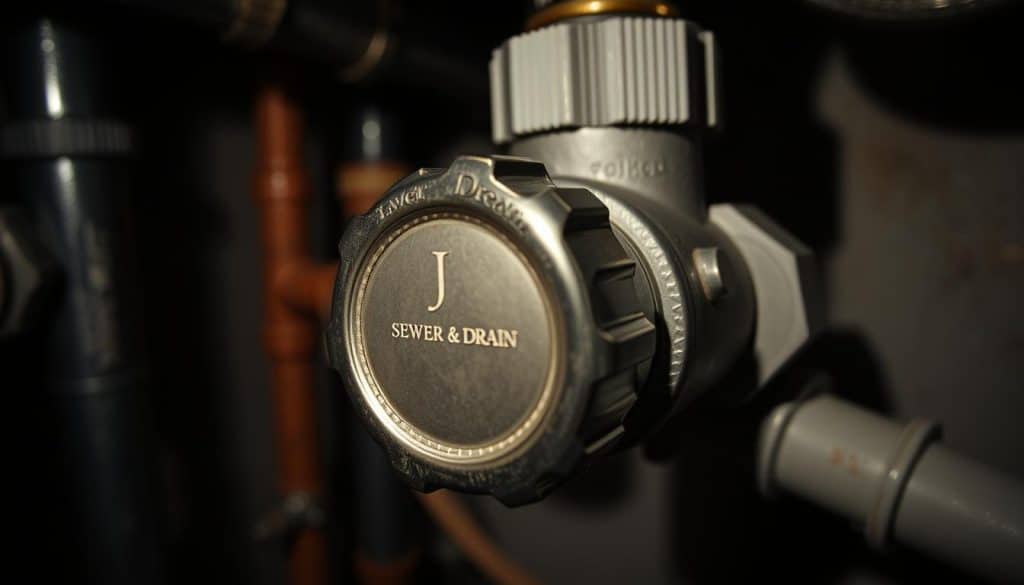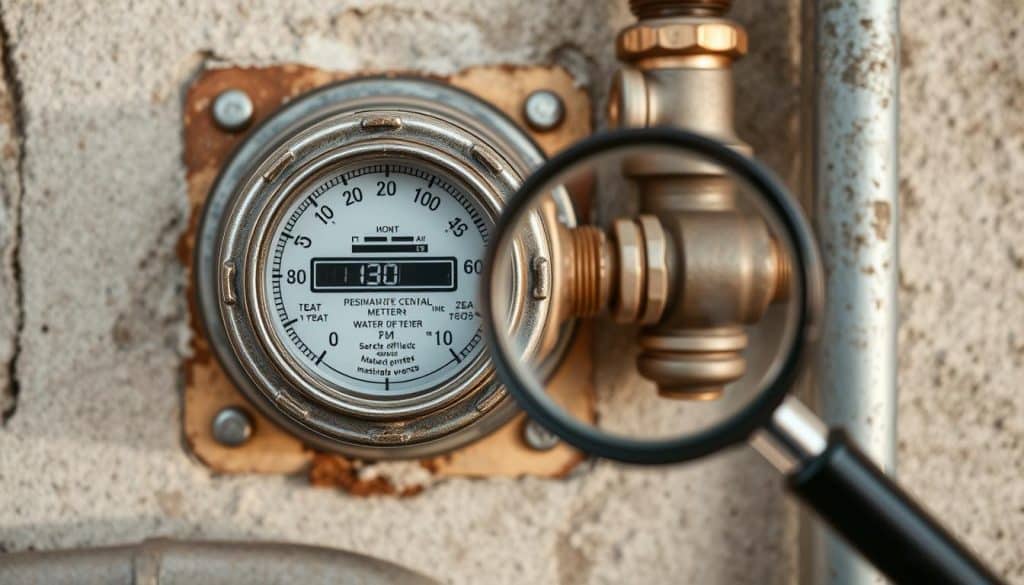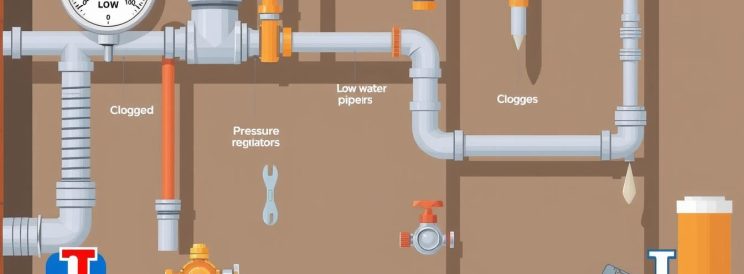Ever wondered What Causes Low Water Pressure, and How Can I Fix it? Low water pressure can really mess up your day, affecting things like showering, washing dishes, and doing laundry. It’s important to know why this happens so you can fix it right.
There are many reasons for low water pressure. It could be something with your water supplier or a problem closer to home. Maybe it’s a wrong valve setting, clogged pipes, or broken fixtures. Finding out what’s causing it is the first step to fixing it.
Key Takeaways
- Low water pressure can significantly disrupt everyday tasks.
- The average household water pressure should be between 40-45 PSI.
- Causes of low water pressure include municipal supply problems, internal plumbing issues, and faulty fixtures.
- Diagnosing the exact issue is crucial for implementing the right fix.
- Both DIY solutions and professional help may be needed depending on the issue.
Common Causes of Low Water Pressure
Many things can cause low water pressure in your home. Knowing what they are can help you fix the problem fast.
Your Water Supplier is Experiencing an Issue
One big reason for low water pressure is problems with your water supplier. Work or changes in rules can cause pressure drops. Checking with your neighbors can tell if it’s just you or everyone.
The Main House Shutoff Valve Isn’t Open All the Way
A valve that’s not fully open can cut down water flow. This leads to lower pressure. Make sure this valve is fully open to solve the problem.
The Pressure Regulator is Failing
Pressure regulators also often cause issues. They keep water pressure steady, but a failure can mess with pressure. Regular checks and adjustments can help avoid these problems.
Knowing these common causes helps homeowners fix water supply issues quickly.
Diagnosing Low Water Pressure at Home
Finding out why your water pressure is low needs a careful plan. First, figure out if the issue is just in your home or if it’s bigger.
Check with Your Neighbors
Start by asking your neighbors if they have low water pressure too. If they do, it might be a problem with the water supply, not your home. But if only you have the issue, you’ll need to look closer.
Inspect your Shutoff Valves
Next, check your shutoff valves. Make sure the main valve and the water meter valve are fully open. If they’re not, it can cut down your water pressure a lot. Looking at your home’s water system can often find simple fixes.
Test the Pressure Regulator
If you have a pressure regulator, it might be the problem. Use a water pressure gauge to see if it’s working right. A bad regulator can cause low water pressure, so it might need fixing or replacing.
How to Increase Water Pressure at Home
Low water pressure at home can be really annoying. But, there are many ways to make water flow better.
Install a Water Pressure Booster
Installing a water pressure booster is a simple solution. It can really boost your water pressure, especially in areas with low pressure. Just remember to check your pipes’ age and size first to get the best results.
Clean or Replace Fixtures
Cleaning or replacing plumbing fixtures can also help. Over time, things like showerheads and faucets can get clogged with minerals. Cleaning or swapping them out can often fix the problem easily.
Upgrade Piping
If your pipes are old or rusty, it’s time to upgrade home piping. Using newer materials like PEX or copper can help. Old pipes, like galvanized steel, can slow down water flow because of rust. Getting help from experts, like those at J Sewer & Drain Plumbing Inc. in Chicago, IL, ensures a job well done.
How to Troubleshoot Low Water Pressure Problems
Low water pressure can be really frustrating. Finding the exact cause is key to fixing it.
Examine Plumbing for Leaks
Checking for plumbing leaks is crucial when dealing with low water pressure. Even small leaks can lead to big drops in pressure. Look for moisture or water stains on visible pipes.
Also, listen for dripping sounds in walls or under floors. While quick fixes might help, they won’t last. You’ll need to replace pipes for a lasting solution.

Experts like J Sewer & Drain Plumbing Inc. are great at finding and fixing leaks. They have the knowledge and guarantees to do the job right.
Address Permits and Inspections
Big plumbing jobs need to follow local rules. This means dealing with permits and inspections. It’s important to avoid legal trouble and ensure work is safe and up to standard.
Trusted services like J Sewer & Drain Plumbing Inc. know how to handle these steps. They make sure all permits are in order and work meets local codes.
By focusing on these areas, you can fix low water pressure issues. This keeps your home’s plumbing working well.
What Causes Low Water Pressure, and How Can I Fix It?
First, we need to find out why water pressure is low. Many homeowners face this problem. But, with the right steps, we can fix it and improve water flow.
Resolving Water Pressure Problems
Fixing low water pressure needs different solutions. Start by checking your plumbing system. Look for closed valves or clogged pipes. Make sure all shutoff valves are fully open.
Also, removing flow restrictors from showerheads can help. This simple step can boost water pressure.
DIY Solutions
If you want to try DIY fixes, there are easy steps. Replacing fixtures or pressure regulators can help. Some repairs, like fixing small pipes, need basic plumbing skills and the right tools.
But, if you’re not sure about shared pipelines or hot water system issues, get professional help. It’s safer and more reliable.
If DIY isn’t your thing, J Sewer & Drain Plumbing Inc. can help. They offer expert services with a 5-year guarantee on underground sewer repairs. They also have a 1-year guarantee on above-ground plumbing installations.
Professional Help for Persistent Issues
When you face ongoing water pressure problems, getting help from experts is wise. DIY fixes and regular checks might not solve deep issues like corrosion or hidden leaks. These can harm your home’s foundation. So, it’s key to get professional plumbing assistance for a safe fix.

In Chicago, IL, J Sewer & Drain Plumbing Inc. is ready to help with tough plumbing issues. They have the skills and quality assurance to fix your problems. They also offer special deals for homeowners with water pressure issues.
Call J Sewer & Drain Plumbing Inc. at (773) 968-2704 for a consultation. Let them take care of your plumbing system.
Conclusion
Dealing with low water pressure is a complex issue. It can come from many sources. You might need to check your water supplier, look at household valves, or test pressure regulators.
Simple fixes could be cleaning aerators or getting a water pressure booster. But, if you have pipe corrosion or leaks, you might need a pro.
For water pressure problems, it’s best to trust plumbing services. Companies like J Sewer & Drain Plumbing Inc. are great at fixing plumbing. They offer guarantees on repairs, giving homeowners peace of mind.
They handle both simple fixes and big system changes. This is perfect for solving any ongoing issues.
Keeping water pressure up is key for your home’s plumbing. Working with experienced pros ensures your plumbing is fixed right. A service with a repair guarantee means your water pressure issues are in good hands.


